COP23: “Green transition in the Mediterranean: from decisions to actions”
The Public Institute for the Promotion of Entrepreneurship and Development Projects of the Municipality of Izola (JZP Izola), as the implementing structure of the Municipality of Izola, served as the local partner of the Ministry of Natural Resources and Spatial Planning for the organizational execution of the 23rd meeting of the Contracting Parties to the Barcelona Convention in Slovenia. Slovenia hosted the 23rd meeting of the Contracting Parties to the Barcelona Convention from December 5 to 8, 2023, in Portorož, where it assumed the two-year presidency of the convention for the period 2024-2025.
Approximately 400 participants attended the four-day meeting, including more than half of the high representatives of 21 Mediterranean countries and representatives of the United Nations, research organizations, the private sector, youth groups, and civil society.
The meeting took place under the theme "Green Transition in the Mediterranean – from Decisions to Actions" with the aim of improving the environmental situation in the Mediterranean and promoting sustainable blue economy.
On Monday, December 4, 2023, before the official program, in collaboration with the Ministry of Natural Resources and Spatial Planning of the Republic of Slovenia and the Maritime Law Association of Slovenia (DPPS), the book "Legal Aspects of Marine Protected Areas in the Mediterranean Sea: An Adriatic and Ionian Perspective" was presented. The book provides an in-depth international legal review of the legal foundations for the establishment and development of marine protected areas in the
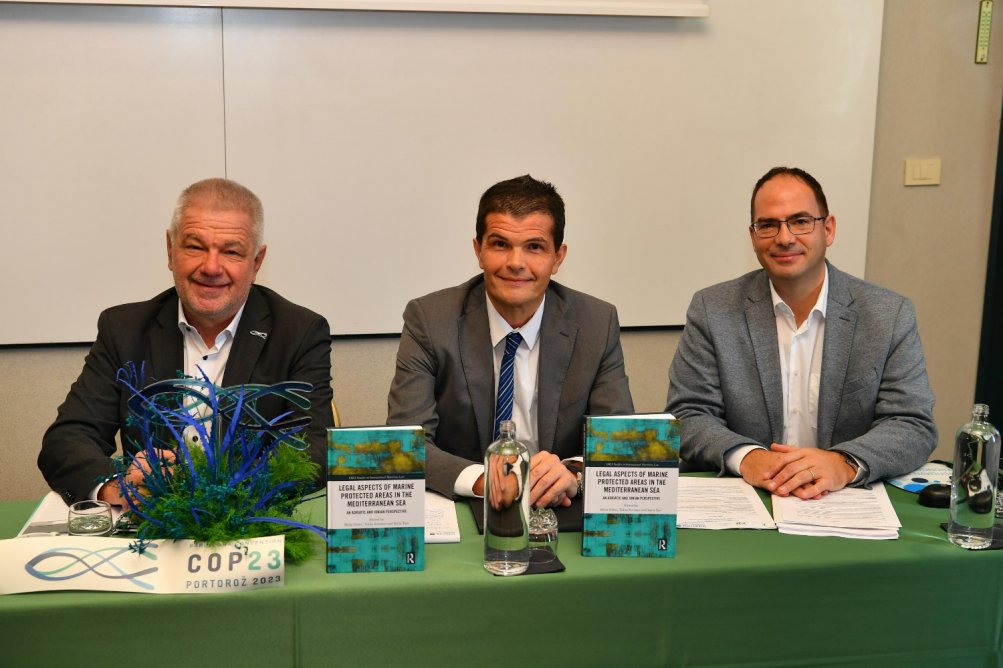
Pictured from left: dr. Mitja Bricelj, doc. dr. Mitja Grbec, mag. Iztok Škerlič
Mediterranean and Adriatic Seas, representing a specific example of collaboration among experts from Slovenia, Italy, and the broader region to achieve goals in biodiversity conservation.
It is intended to contribute to fulfilling the goals of the EU Biodiversity Strategy for 2030 and can serve as a practical tool for those involved in the protection of marine areas at the local, regional, or national levels.
The official opening of the meeting took place on Tuesday, December 5, 2023, with addresses from representatives of Turkey as the outgoing chair and Slovenia as the new presiding state of the Barcelona Convention, as well as representatives of the United Nations Environment Programme (UNEP), under which the convention operates. The meeting was officially opened by Fatma Varank, Deputy Minister of Environment, Urbanization, and Climate Change of Turkey and Chair of the Presidency of the Contracting Parties to the Barcelona Convention, Maša Kociper, State Secretary in the Cabinet of the Prime Minister of the Republic of Slovenia, Elizabeth Maruma Mrema, Deputy Executive Director of the United Nations Environment Programme (UNEP), and Tatjana Hema, Coordinator of the UNEP/MAP Mediterranean Action Plan.
In addition to the plenary meeting of the Contracting Parties (21 countries and the European Union), where they reviewed the implementation of the convention and its protocols and outlined the direction of action for the next two years, the program included a Ministerial Meeting held on Thursday, December 7, 2023.
The start of the day featured addresses by Prime Minister Dr. Robert Golob and State Secretary Maša Kociper, who opened the daily session. This was followed by a substantive discussion in which distinguished Slovenian scientist, one of the pioneers in the fight against climate change, Dr. Lučka Kajfež Bogataj, participated.
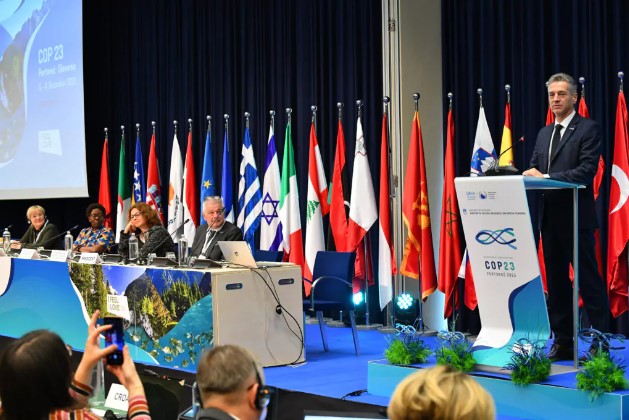
Address by the Primer Minister of Slovenia Dr Robert Golob. Photo by Peter Irman
The Ministerial Meeting, where the Portorož Declaration was adopted, represented the central event of the third day of the meeting.
The main theme of the Portorož Ministerial Declaration is the green transition, including:
- Commitment to reducing pollution from plastic and microplastics, effective from 2024,
- Accelerated implementation of maritime planning and integrated management of coastal areas, defining activities and land use in coastal areas precisely and restricting construction in the hundred-meter coastal strip,
- Strengthening international cooperation in the fight against climate change with concrete activities and public awareness,
- Conservation of coastal biodiversity and protection of at least 30% of marine areas by 2030, including areas beyond national jurisdiction,
- Acceleration of decarbonization of maritime transport and reduction of greenhouse gases in connection with the establishment of a sulfur oxide-free zone in the entire Mediterranean, effective from May 1, 2025, and continuation of the process to establish a zone for maritime transport without emissions of nitrogen oxides in the entire Mediterranean,
- Encouraging all contracting parties to ratify all 7 protocols of the Barcelona Convention as soon as possible, especially amendments to the Dumping Protocol, with the aim of entering into force by the end of 2024,
- Advocating for achieving and maintaining a good environmental status of the sea throughout the entire Mediterranean,
- Promoting sustainable development with the principles of the blue economy and green transition.
The Portorož Ministerial Declaration was adopted at the conclusion of the ministerial meeting, and negotiations for its content lasted several weeks under the leadership of the Slovenian delegation. With it, ministers of Mediterranean countries committed to more effective implementation of global and regional agreements, including several legally binding decisions to protect the Mediterranean. The countries unanimously supported the establishment of a new regional climate change research center based in Turkey.
Furthermore, the Portorož Ministerial Declaration places significant emphasis on the participation of youth, civil society, and other stakeholders in addressing environmental challenges and encourages strengthening cooperation between generations. It emphasizes the need to update educational programs towards sustainable development, better adaptation to climate change, biodiversity conservation, and pollution prevention.
In light of the emphasis on youth participation, young people presented their views on current climate conditions during the official sessions. As part of the concluding day of COP 23, a side event titled "Education and Youth: Processes and Actors for Ensuring the Sustainable Future of the Mediterranean Region" was also organized exclusively for them.
Throughout the entire meeting, numerous other side events took place, involving representatives of non-governmental organizations and scientific institutions. These side events sparked discussions on current topics related to the protection of the sea and coast, especially given the increasing impact of climate change and water pollution.
Key conclusions of the four-day COP 23 meeting included the adoption of a new work program and budget for 2024-2025, the signing of the Portorož Ministerial Declaration, and the acceptance of the following substantive decisions to protect marine ecosystems:
- Three new legally binding regional plans to prevent pollution from agriculture, aquaculture, and urban stormwater runoff, along with updated guidelines for the Dumping Protocol,
- Restoration program for the endangered species of the Mediterranean endemic monk seal, whose populations in the Mediterranean have drastically declined in recent years,
- Two updated action plans for the conservation of marine and coastal birds and the prevention of the introduction of invasive alien species,
- Decision for the strict protection of six species of endangered marine sharks and rays and partial protection of three additional species,
- Procedures for coordinated implementation of the Convention on Ballast Water Management in the Mediterranean,
- Framework for coordinated implementation of maritime spatial planning in the Mediterranean,
- New report on the State of the Mediterranean 2023, indicating a concerning state of the marine environment and emphasizing the urgency of action,
- Countries unanimously supported the establishment of a new regional research center for climate change, based in Turkey.
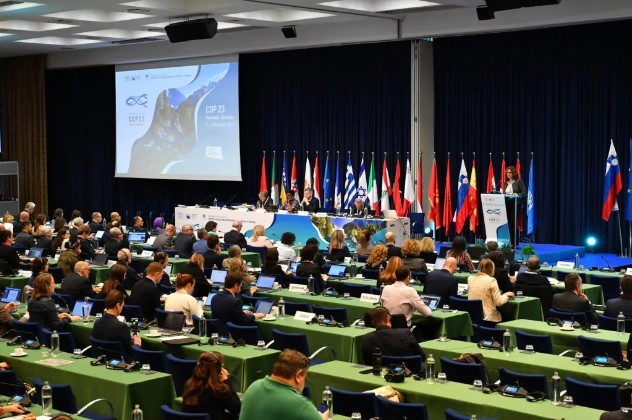
Photo by Peter Irman
You might be interested in
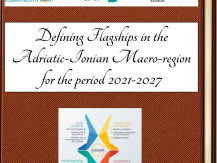
EUSAIR flagships all summed up!
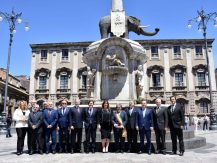
3rd EUSAIR Annual Forum – CATANIA DECLARATION

The Hellenic Republic assumes the Presidency of the EU Strategy for the Adriatic and Ionian Region (EUSAIR) (1 June 2024 – 31 May 2025)








